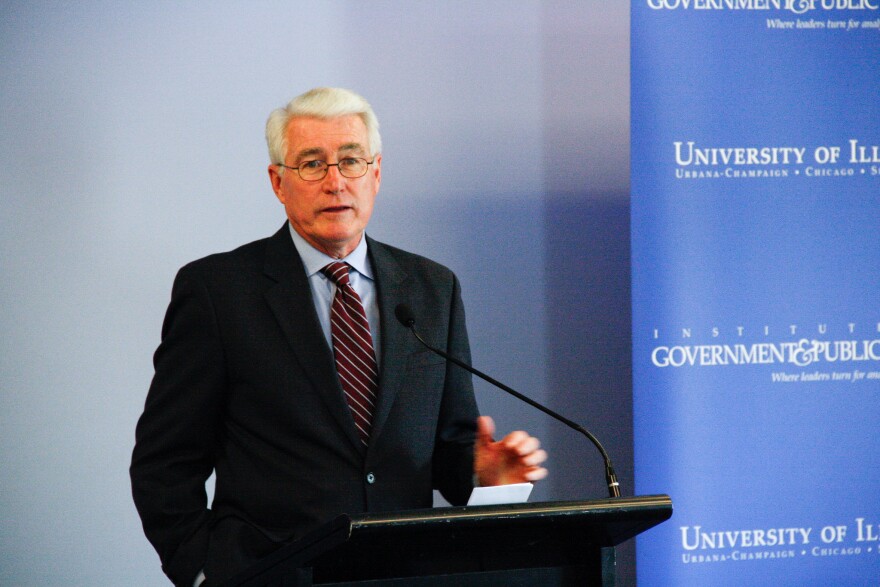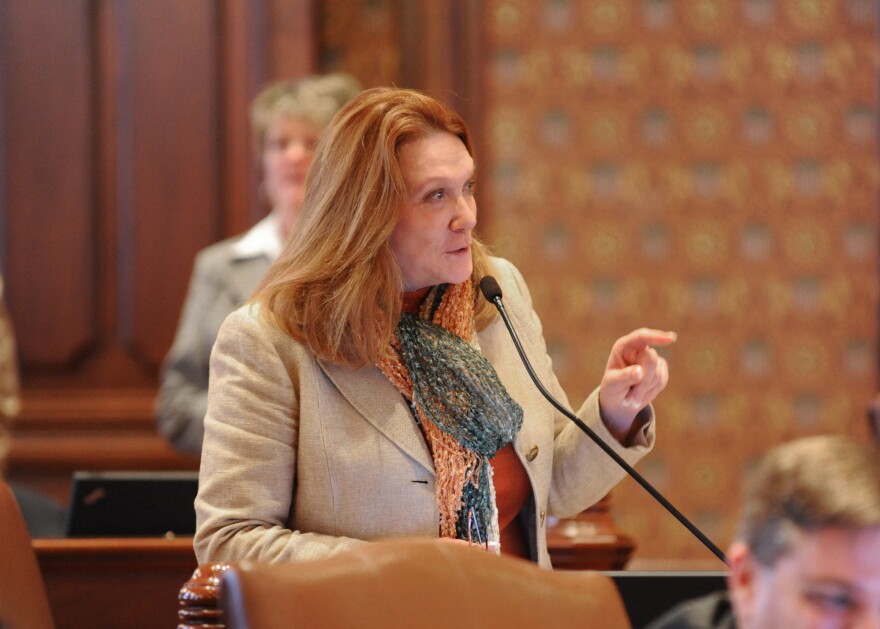Former and outgoing Illinois leaders offer suggestions for the man going to the mansion.
With J.B. Pritzker on his way to the Illinois governor’s mansion, he can now begin mapping out the direction the state will take in the next several years.
For some advice on what that direction should be, and how to get there, NPR Illinois’ Maureen McKinney and Sam Dunklau caught up with a few former governors and legislative leaders to hear what advice they had.
Republican Jim Edgar served as Illinois’ governor though most of 1990s. He'll now serve on Pritzker's transition team over the next few months. Though it’s been a while since he’s been in the chief executive chair, he says he learned an important lesson while there:
“You get there, you look at the books and you face the realities, you’ve got to compromise. You never get 100 percent of what you want. You know, you’ve got to give a little bit to get some things,” he says.
Edgar says compromise should be first in the governor’s mind as he prepares to assume office. But even more important, he says, is how he talks about it in the first place. While partisan bickering has dominated Illinois state government over the last few years, Edgar says Pritzker now has a chance to turn that around:
“The governor needs to kind of change the tone in Springfield, and needs to try and reach out and work with both parties. If you don’t have a better climate to get things done, particularly tough things, you’re not going to get things done.”

When we asked him what he’d do if he were in Pritzker’s shoes, Edgar gave this advice: surround yourself with good people.
“I think it’s important that, whoever the governor is, that that governor has people around him that also know state government and let me underline, ILLINOIS state government. You know, he’ll be able to move much quicker and begin to deal with some of the problems the state is facing.”
On the Democratic side, forner Gov. Pat Quinn offered some advice from his more recent tenure as governor. He six-year administration started in 2009, after Governor Rod Blagojevich was infamously impeached and imprisoned. Through his ups and downs, Quinn says he learned one particularly important thing:
“Campaigning is easy. Governing is a lot harder. So, any person becoming Governor of Illinois has to really kind of come to that job with that understanding. Being the governor is a hard job. (You’ve) got to work at it every day.”
One of the things the governor has to work at every day is the annual state budget. We asked Quinn if he thought the chief executive would contribute to another years-long impasse.
“Well, I passed six budgets when I was governor. It’s never easy; you’ve go to always listen to every side, but ultimately you’ve got to get the job done,” he says.
One job Quinn says the governor could try to get done in the next four years —besides the budget — is one the legislature tried to address last year.

“We definitely have to raise the minimum wage in Illinois, it’s far too low,’’ he says, “The current governor has failed to do that. That should be job one for the new governor.”
We also wanted to hear what women have to say to Illinois’ incoming governor, so we talked to a few leaders in the General Assembly. From her vantage point in the state House of Representatives, Democrat Barbara Flynn Currie has seen decades of governorships on both sides of the aisle. One thing, she says, remains true:
“Governors are not emperors. They can't just decree. They can't wave a magic wand and it is so! The job of governing is really a compromise, a collaborative, a willingness to come together in some kind of middle,” she says.

Coming to a kind of middle, Currie says, will be particularly important if the governor tries to tackle transportation issues. People all over the state say it’s an area that desperately needs fixing.
“It's going to be something of a balancing act. There are many different kinds of things that fall under the rubric infrastructure, and the tough question will be how you decide to divide up the resources that, however you bring them in, you bring them in to do the job,” she says.
When we asked her where education should be in the governor’s list of priorities, Currie pointed to the new education funding formula legislators passed last year.
The challenge for the next governor is to see to it that year, over year, over year, we’re able to find the resources to put more money into public schools,” she says,
Meanwhile, in the state Senate, Pamela Althoff was a key player in the Illinois GOP for sixteen years. This year marked her last session as a state senator. But before she retired, she saw governors of both parties go to jail and another two serve wildly different terms. A common thread?
“Honor and respect the process, as well as honor and respect those people who make up the process,” she says.

Diversity, Althoff says, is something the chief executive should keep in mind over the next four years.
“Many governors of both parties lost sight of the fact that Illinois is an extremely diverse state, and it's very important for us to continue to carry on dialogues; to learn what we do have in common and what our concerns are,” she says.
No matter what comes across the governor’s desk in this next term, Althoff is in lockstep with her other colleagues: she says crossing lines will do a lot more than drawing lines.
“The governor's job is to come in with his own agenda and collaborate, and say, ‘This is what I would like to see. How is it we work together to achieve this?’”

Illinois Issues is in-depth reporting and analysis that takes you beyond the headlines to provide a deeper understanding of our state. Illinois Issues is produced by NPR Illinois in Springfield.






